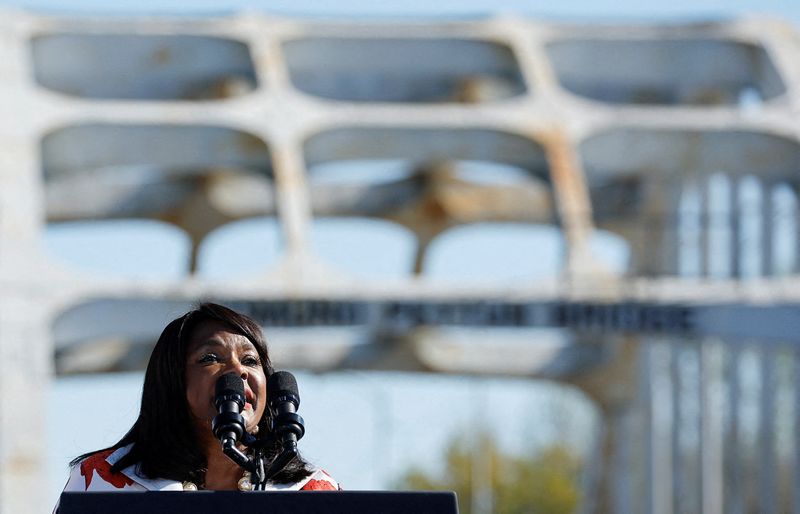By Josephine Walker and Joseph Ax
(Reuters) -Alabama's Republican-controlled legislature on Friday passed a new congressional map that increased the number of Black voters in one of the state's districts, but Democrats said the plan defied a U.S. Supreme Court ruling intended to protect minority voters' rights.
Civil rights groups have already vowed to challenge the new map in court, a month after the Supreme Court ruled that the state's previous district lines marginalized the state's sizable Black population in violation of the Voting Rights Act.
"Alabama lawmakers appear hell-bent on preventing Black voters from fully participating in the democratic process and they are blatantly ignoring their constituents, federal law, and the highest court of the land to disenfranchise us," one plaintiff in the Supreme Court case, Scott Douglas, the executive director at Greater Birmingham Ministries, said in a statement.
More than one-quarter of Alabama's residents are Black, but under a Republican-drawn map approved in 2021, only one of the state's seven congressional districts, the 7th, is majority Black. The state's lone Democratic U.S. representative, Terri Sewell, represents that district.
After the Supreme Court decision, a federal three-judge panel gave lawmakers until Friday to create a second district with either a Black majority or "something quite close" to give Black voters another opportunity to elect a representative of their choice.
The new map increases the proportion of Black voters in the 2nd district from about 32% to 40%, a level that Democrats and civil rights groups said was not enough to comply with the court's directive.
Adding another majority-Black district, as the Supreme Court plaintiffs have proposed, would increase Democrats' chances of picking up another seat in the 2024 elections. Republicans hold a narrow 222-213 majority in the U.S. House of Representatives.
Democratic lawmakers decried the move on the floor of the legislature. Senator Bobby Singleton, a Black Democrat, accused fellow lawmakers of playing a "game" with Black voters.
"We don't care about your voice," Singleton said. "That's what it ultimately ends up saying."
But Republicans said they were confident the 2nd district's new lines provided a meaningful opportunity for Black voters.
Michael Li, a redistricting expert with New York University's Brennan Center for Justice, called the Republican plan "flabbergasting," saying it fell far short of the court's order.
"The court ruling was very clear about what you need to have in order to satisfy the Voting Rights Act," he said.

The map will require approval from the federal three-judge panel. If the court determines that the new map is still illegal, a court-appointed special master would draw a new version to be used in the 2024 congressional election.
Last week, a New York state appeals court ordered lawmakers to redraw the state's congressional map. The decision, opposed by Republicans, could give the Democratic-controlled legislature a chance to flip as many as half a dozen Republican-held U.S. House seats by enacting a partisan plan.